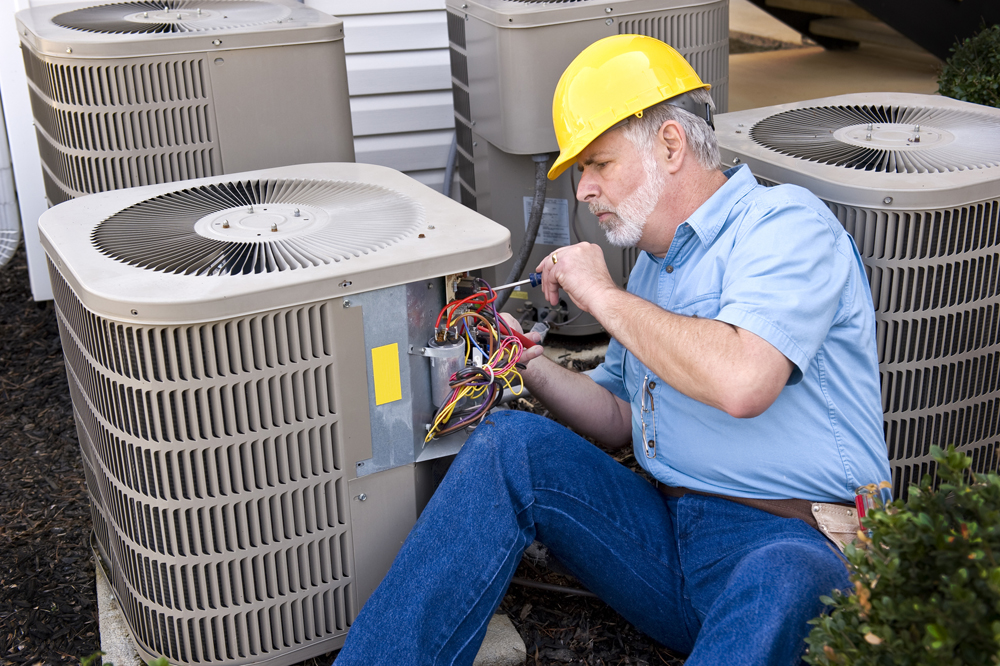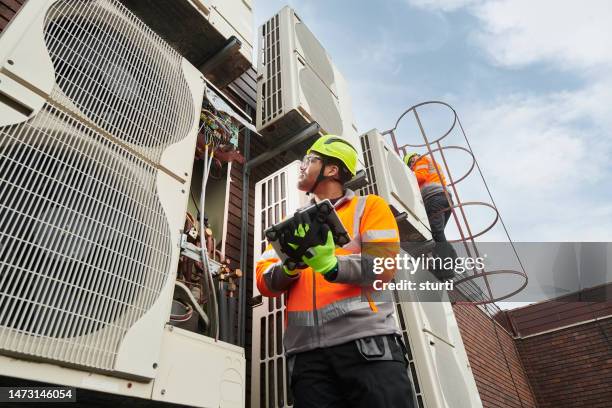Selecting Between a Warmth Pump and Furnace: Trick Considerations for Your HVAC Needs
When reviewing home heating choices for a/c requires, the choice between a heatpump and a heater can be complicated. Each system supplies distinctive advantages tailored to specific climates and power effectiveness objectives. Comprehending these differences is essential for making an educated selection. Secret elements such as installment costs and environmental impact even more complicate the selection process. Which alternative genuinely straightens with one's comfort and sustainability choices? The following areas will discover these considerations in information.
Comprehending Heat Pumps: Exactly How They Function and Their Advantages
While lots of property owners consider different heating choices, comprehending how heat pumps feature and their benefits can considerably affect their choice. Heatpump operate by transferring heat instead of creating it. In the winter months, they remove warm from the outdoors air or ground and move it inside your home, while in the summer season, they reverse this process, cooling the home by removing heat outside. This twin capability makes them flexible for year-round environment control.One of the primary benefits of heat pumps is their power performance. They make use of substantially less power contrasted to traditional home heating systems, potentially causing reduced energy expenses (heat pump service). Additionally, heatpump have a smaller carbon footprint, making them an eco-friendly option. They likewise require less maintenance than standard systems, adding to lasting cost financial savings. In general, comprehending the technicians and benefits of heatpump can assist homeowners make informed choices regarding their heating and cooling requirements
Discovering Furnaces: Kinds, Procedure, and Benefits
Heaters can be found in numerous kinds, including gas, electric, and oil models, each with distinct operational systems. Recognizing these differences is crucial, as they affect efficiency and home heating efficiency. In addition, heating systems provide many advantages, such as constant warmth result and dependability in cooler climates.
Kinds of Heating systems
Heating unit can vary substantially in design and operation, with furnaces being a popular option among property owners. There are a number of types of furnaces, each using various gas resources and modern technologies. Gas furnaces prevail, leveraging gas to create warmth efficiently. Electric furnaces, on the various other hand, utilize electric resistance to create warmth, typically favored for their simple installation. Oil furnaces, while less common, are reliable in areas with limited gas accessibility (heat pump installation ooltewah tn). Additionally, condensing heaters maximize power effectiveness by reusing and capturing exhaust gases. Each kind operates via a system of heat exchangers and ductwork to distribute cozy air throughout a home. Understanding the differences in between these furnace kinds is crucial for notified heating and cooling decisions
Advantages of Heaters
For house owners seeking reliable heat throughout chilly months, the benefits of heating systems are significant. Heating systems provide consistent heating, guaranteeing even temperatures throughout the home. They are specifically effective in extreme chilly, often outmatching heatpump in freezing problems. Various types, including gas, electrical, and oil furnaces, offer versatility to meet diverse needs and preferences.Furnaces additionally have a tendency to have lower first installment costs compared to warmth pumps, making them a much more obtainable option for several. Their robust design adds to a much longer life-span, with several devices lasting over 15 years with appropriate upkeep. In addition, contemporary heating systems are often outfitted with sophisticated innovation for boosted effectiveness, which can cause minimized energy costs. Generally, furnaces stay a dependable selection for reliable home heating.

Power Performance: Comparing Warmth Pumps and Furnaces
When comparing power effectiveness in between warm pumps and heating systems, the Seasonal Power Effectiveness Ratio (SEER) plays an important duty in establishing performance. In addition, a functional cost analysis exposes the lasting financial effects of each system. Comprehending these aspects can guide home owners in making informed decisions concerning their home heating remedies.
Seasonal Power Performance Proportion
Energy efficiency plays an essential duty in the decision-making process between heatpump and heating systems, particularly when thinking about the Seasonal Energy Effectiveness Ratio (SEER) This metric procedures the cooling efficiency of heat pumps over a whole air conditioning period, supplying a standardized way to review efficiency. Greater SEER rankings suggest higher power efficiency, converting to lower power intake and reduced utility bills. On the other hand, heating systems are typically assessed making use of the Yearly Fuel Utilization Effectiveness (AFUE) ranking, which shows heating efficiency. When comparing these two systems, homeowners need to prioritize SEER ratings for heat pumps, as they straight effect general power savings and environmental sustainability. A comprehensive understanding of SEER can notably influence the lasting contentment and cost-effectiveness of the picked HVAC option.
Functional Cost Evaluation
Understanding the operational expenses connected with heatpump and heaters is important for house owners examining their alternatives. Heatpump generally provide greater energy effectiveness, transforming electrical power right into warmth with marginal waste. This leads to lower monthly energy costs, especially in modest environments. Alternatively, traditional heating systems, specifically gas versions, might have reduced ahead of time expenses yet can sustain greater operational expenditures gradually due to sustain prices and efficiency ratings.Moreover, heatpump can work as both heating and cooling systems, possibly lowering the requirement for separate heating and cooling units. While preliminary investments for heatpump may be higher, their long-lasting financial savings in power performance can make them a more affordable option for lots of households. Mindful evaluation of local energy prices is vital to identify the most effective choice.
Installation Costs: What to Expect for every Heating System
Setup costs for heating unit can vary substantially in between warm pumps and visit this site heaters, affecting house owners' choices. Heat pumps generally have greater upfront setup prices, typically ranging from $3,500 to $8,000, depending upon the system dimension and intricacy of installment. This consists of the outdoor device, interior handling system, and necessary ductwork alterations. Conversely, heaters have a tendency to have lower preliminary expenses, balancing between $2,500 and $6,000, which can be appealing for budget-conscious property owners. Nevertheless, installation expenses can raise if substantial ductwork is required.Moreover, the selection of gas type for heaters-- natural gas, gas, or electrical-- can additionally affect installment prices. While warmth pumps use power efficiency, their initial investment may prevent some purchasers. Inevitably, assessing setup prices together with lasting savings and performance will aid homeowners in making educated decisions about their heating unit.
Environment Considerations: Which System Executes Better in Your Location
Exactly how do environment problems affect the efficiency of furnace? The performance of warmth pumps and heaters can vary significantly depending on the neighborhood environment. In moderate environments, heat pumps succeed by effectively transferring warmth from the outdoors air, making them an energy-saving alternative. Nonetheless, their effectiveness lessens in extremely cold temperatures, where they may have a hard time to draw out enough heat. Alternatively, heaters, particularly gas designs, provide regular and dependable warm despite outside conditions, making them preferable in colder regions.In areas that experience milder winter seasons, heatpump can operate effectively year-round, giving both heating and air conditioning. On the other hand, areas with extreme winter seasons often take advantage of the robustness of furnaces. Eventually, understanding the neighborhood environment is essential when determining between a heat pump and a furnace, as it straight influences their functional effectiveness and total efficiency.
Maintenance Needs: Long-Term Take Care Of Heat Pumps vs. Furnaces
While both warm pumps and heaters require routine upkeep to ensure peak efficiency, their details demands and care regimens vary significantly. Furnaces usually require less frequent attention, with yearly evaluations sufficing to examine for gas leaks, tidy filters, and assess overall functionality. Their less complex style usually permits for straightforward repairs.In contrast, heatpump demand semiannual upkeep because of their dual function in heating and cooling. This consists of cleaning coils, checking cooling agent levels, and guaranteeing that both the outside and indoor systems resource work at their ideal. In addition, warmth pump maintenance frequently involves more intricate parts, making specialist maintenance essential.Neglecting upkeep can lead to diminished performance and increased power costs for both systems. Inevitably, house owners must think about these long-term treatment requirements when selecting between a heatpump and a heating system, as positive upkeep can expand the life expectancy and efficiency of either system significantly.
Environmental Influence: Selecting a Lasting Home Heating Option
The ecological impact of home heating systems is a vital analysis for property owners looking for sustainable alternatives. Heatpump are generally much more energy-efficient than conventional heating systems, as they move warm instead than create it, considerably decreasing carbon discharges. By utilizing sustainable power sources, such as air-source or geothermal heatpump, homeowners can additionally decrease their environmental footprint.On the various other hand, gas furnaces release greenhouse gases and add to air pollution, though they frequently offer greater heat result. However, innovations in innovation have caused the growth of high-efficiency heating systems that lessen emissions.Ultimately, picking a heating unit includes evaluating effectiveness versus environmental influence. House owners are urged to reflect on neighborhood power resources and incentives for renewable systems, making sure a choice that aligns with both personal convenience and ecological duty. The choice influences not only prompt convenience however also long-lasting sustainability and ecological health and wellness.
Regularly Asked Concerns
How Much Time Do Warmth Pumps and Furnaces Typically Last?
The life-span of warmth pumps generally ranges from 15 to twenty years, while heating systems can last in between 15 to thirty navigate to these guys years. Normal upkeep considerably affects their long life and effectiveness in supplying home heating solutions.
Can I Use a Heatpump in Incredibly Cold Climates?
Heatpump can operate in incredibly chilly climates, but their performance diminishes as temperature levels decline. In such conditions, extra home heating resources might be necessary to preserve comfortable interior temperatures and assure peak performance.

What Is the Noise Level of Warmth Pumps Versus Furnaces?
The noise degrees of heat pumps and heaters differ considerably. Usually, warmth pumps run more quietly than traditional furnaces, making them preferable for those conscious sound, while furnaces might generate louder functional noises throughout heating cycles.
Are Warm Pumps Suitable for Both Home Heating and Cooling?
Warm pumps are indeed ideal for both cooling and heating (heat pump service). They function by moving warmth, giving reliable temperature control year-round, making them a versatile selection for homeowners seeking an all-in-one a/c solution
What Dimension Furnace Do I Required for My Home?
Figuring out the suitable dimension home heating system for a home requires reviewing variables such as square video, insulation quality, regional environment, and the home's layout. Consulting a professional can ensure an exact assessment and excellent comfort. Heat pumps normally provide greater energy performance, transforming electrical energy right into warm with very little waste. In moderate climates, warm pumps excel by successfully moving warm from the outside air, making them an energy-saving alternative. On the other hand, heaters, especially gas models, provide regular and reliable heat regardless of exterior problems, making them more effective in colder regions.In areas that experience milder winters, warmth pumps can operate properly year-round, providing both home heating and cooling. Heat pumps are generally more energy-efficient than typical heating systems, as they move warmth instead than generate it, considerably minimizing carbon emissions. By using sustainable energy sources, such as geothermal or air-source warmth pumps, property owners can even more minimize their ecological footprint.On the other hand, natural gas heating systems discharge greenhouse gases and add to air pollution, though they commonly provide higher heat outcome.